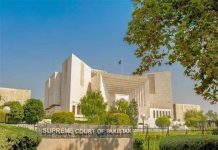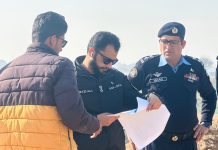By Asim Hussein
ISLAMABAD: Experts at the working session of the second day of the Islamabad Conclave on Thursday, called for a major structural transitional shift in the economic system of the country and deregulation of the professional entities to ensure financial sustainability and revival of the economy.
The Institute of Strategic Studies Islamabad (ISSI) at its flagship event of “Islamabad Conclave” hosted a working session on “Comprehensive Security in a World in a Flux” on the second day of the forum.
The keynote address was delivered by former Minister of State for Finance and Revenue, Dr Ayesha Ghaus Pasha.
The speakers included former Chairman, Board of Investment, Haroon Sharif; Country Head, Population Council, Dr. Zeba Sattar; Country Director, World Bank, Najy Benhassine and Chairman Economic Security, IPRI, Dr. Aneel Salman.
In her keynote address, Dr Aisha Ghaus Pasha said that the country was at the stage where her external financial needs were at the level where it could not oblige international obligations.
“These are uncertain times and it has to bring structural reforms that will be difficult due to strong elite voices but we have to sustain it and come up with a separate structural transitional system,” she said. She expressed her optimism that the nation would have to come together to achieve this ambition even in this time of crisis.
The International Monetary Fund (IMF) projections are that Pakistan needs $63 billion in the next three years in external financing, whereas in the last two decades, the index value for Pakistan is 0.3 to 0.4 percent which has been low and on a declining trend from 2001 to 2021, Dr Aisha added.
She said, “Human Security in a comprehensive sense is people free from fear, want, inequality and have opportunity what they want in their life”. The former minister noted that the external financial vulnerability of the country was a serious matter as the total level of imports was over $70 billion that was being met through exports and remittances, and the exports were merely earned of $30 billion which created a mammoth gap. The two gaps, she said in the domestic side were big budget deficit and poor tax revenue whereas currently the tax revenue receded that could not finance imports. “The country’s economy do not need aid any more but rather it can be sustained through exports’ promotion, trade and investment which should be the top priority of the government,” Dr Ayesha said.
She noted that environmental protection and natural disaster, energy and food security needs to be addressed, whereas income inequality is an another important area that should be given due consideration.
“Our tax mobilization is focused on indirect taxes that burdened the poor class and it’s time to tax the elite, whereas the elite capture is of more than Rs 2 trillion as tax policy correction is important,” she added.
Former Chairman Board of Investment, Haroon Sharif said the economic system transition is a serious concern as the country had recognized Pakistan among the debt stressed countries.
He said that at present with this GDP growth, the country could not achieve simple economic opportunities for the masses. “We have weak base of exports and external pressures cannot go away unless export base has been made competitive. The country needs structural reforms from synchronization of ministries like to manage economic affairs and foreign ministries as a single division,” he added.
The country, he said needed to shift resources from subsidies to investments and also need to make state machinery fit for this transition. “Deregulation of professional institutions like Privatisation Commission, BOI and Planning Commission that are technical bodies is key to improve economic system,” he added. Country Head, Population Council, Pakistan, Dr. Zeba Sattar said the current census was more a political appeasing census. She added that there was a huge imbalance and policy failure in terms of population boom as the nation was giving birth to a large uneducated population in the country.
“We have one of the largest out of school children number which needs to be addressed on priority basis,” she added. Dr Aneeq Salman said Pakistan’s position on sustainable development stated that Pakistan has moved from economic growth to economic development. He highlighted four main threats and challenges including ecological degradation, social polarisation, economic crisis and fundamental terrorism. Najy Benhassine pointed out the country’s confronting crises, highlighting three significant challenges: a human capital crisis, climate change concerns, and economic instability. Despite these pressing issues, he underscored that the primary worry lies in the collective will to address the foundational causes of these crises.
Experts for major transitional shift in economic system
By Asim Hussein
ISLAMABAD: Experts at the working session of the second day of the Islamabad Conclave on Thursday, called for a major structural transitional shift in the economic system of the country and deregulation of the professional entities to ensure financial sustainability and revival of the economy.
The Institute of Strategic Studies Islamabad (ISSI) at its flagship event of “Islamabad Conclave” hosted a working session on “Comprehensive Security in a World in a Flux” on the second day of the forum.
The keynote address was delivered by former Minister of State for Finance and Revenue, Dr Ayesha Ghaus Pasha.
The speakers included former Chairman, Board of Investment, Haroon Sharif; Country Head, Population Council, Dr. Zeba Sattar; Country Director, World Bank, Najy Benhassine and Chairman Economic Security, IPRI, Dr. Aneel Salman.
In her keynote address, Dr Aisha Ghaus Pasha said that the country was at the stage where her external financial needs were at the level where it could not oblige international obligations.
“These are uncertain times and it has to bring structural reforms that will be difficult due to strong elite voices but we have to sustain it and come up with a separate structural transitional system,” she said. She expressed her optimism that the nation would have to come together to achieve this ambition even in this time of crisis.
The International Monetary Fund (IMF) projections are that Pakistan needs $63 billion in the next three years in external financing, whereas in the last two decades, the index value for Pakistan is 0.3 to 0.4 percent which has been low and on a declining trend from 2001 to 2021, Dr Aisha added.
She said, “Human Security in a comprehensive sense is people free from fear, want, inequality and have opportunity what they want in their life”. The former minister noted that the external financial vulnerability of the country was a serious matter as the total level of imports was over $70 billion that was being met through exports and remittances, and the exports were merely earned of $30 billion which created a mammoth gap. The two gaps, she said in the domestic side were big budget deficit and poor tax revenue whereas currently the tax revenue receded that could not finance imports. “The country’s economy do not need aid any more but rather it can be sustained through exports’ promotion, trade and investment which should be the top priority of the government,” Dr Ayesha said.
She noted that environmental protection and natural disaster, energy and food security needs to be addressed, whereas income inequality is an another important area that should be given due consideration.
“Our tax mobilization is focused on indirect taxes that burdened the poor class and it’s time to tax the elite, whereas the elite capture is of more than Rs 2 trillion as tax policy correction is important,” she added.
Former Chairman Board of Investment, Haroon Sharif said the economic system transition is a serious concern as the country had recognized Pakistan among the debt stressed countries.
He said that at present with this GDP growth, the country could not achieve simple economic opportunities for the masses. “We have weak base of exports and external pressures cannot go away unless export base has been made competitive. The country needs structural reforms from synchronization of ministries like to manage economic affairs and foreign ministries as a single division,” he added.
The country, he said needed to shift resources from subsidies to investments and also need to make state machinery fit for this transition. “Deregulation of professional institutions like Privatisation Commission, BOI and Planning Commission that are technical bodies is key to improve economic system,” he added. Country Head, Population Council, Pakistan, Dr. Zeba Sattar said the current census was more a political appeasing census. She added that there was a huge imbalance and policy failure in terms of population boom as the nation was giving birth to a large uneducated population in the country.
“We have one of the largest out of school children number which needs to be addressed on priority basis,” she added. Dr Aneeq Salman said Pakistan’s position on sustainable development stated that Pakistan has moved from economic growth to economic development. He highlighted four main threats and challenges including ecological degradation, social polarisation, economic crisis and fundamental terrorism. Najy Benhassine pointed out the country’s confronting crises, highlighting three significant challenges: a human capital crisis, climate change concerns, and economic instability. Despite these pressing issues, he underscored that the primary worry lies in the collective will to address the foundational causes of these crises.





